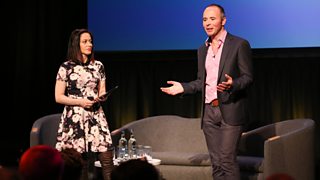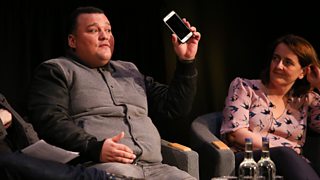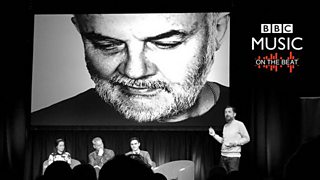
Mark Mulligan with On the Beat host LJ Rich
Today the music industry is at a really important crossroads - so Mark Mulligan, music tech industry analyst, blogger and self-professed big-mouth told us during his key note at our On The Beat Βι¶ΉΤΌΕΔ Music tech conference last week. 2014, when streaming came of age, was, ‘transformational for the music industry,’ which he believes remains in decline. Defining the best route to take at this crossroads (which, in fact, is more like Spaghetti Junction) will be critical in shaping its future.
At the Βι¶ΉΤΌΕΔ, we know that technology will continue to drive change in the way our audiences consume, discover and share music. We felt the need to start a discussion around ‘where next?’ and address some of the common issues facing us, at the Βι¶ΉΤΌΕΔ, as well as the wider industry. And, from this, was born the idea for a Βι¶ΉΤΌΕΔ digital music conference - On the Beat.
So, the day after we celebrated the best of music this year with some of the world’s leading artists at the Βι¶ΉΤΌΕΔ Music Awards, we brought together some of the key stakeholders in the digital music industry in, what turned out to be, a full house at the Βι¶ΉΤΌΕΔ Radio Theatre and Media Cafe.
It was a fast-paced and upbeat afternoon with a packed and varied agenda. Our host, Click presenter and musician, LJ Rich, did a stellar job of keeping energy levels high, not least by having a tinkle or two on the keyboard. So much was covered but here’s a whistle stop tour, including some of my highlights and key take-aways from the afternoon.
Artists need to ‘find their popcorn’
After James Purnell’s welcome, taking us back to the birth of the DJ (and ultimately the creation of the Βι¶ΉΤΌΕΔ) in a hut in Writtle, Mark Mulligan set the scene with his keynote: Evolution of the Beat: How Fans and Data are Transforming the Industry.
Although he defined the music industry overall as being in decline, some markets such as the Nordics are seeing growth driven by subscription services. Mark questioned whether stand-alone music services can compete when tech giants such as Google, Apple and Amazon are able to use music as a loss leader for their other products and services. And, in an analogy with cinema’s strategy to better monetize movie-going, suggested artists need to ‘find their popcorn’; in a world where only 20-25% (and possibly less in the future) of artist revenues come from music sales, they need to look for alternative ways of monetising and find innovative ways of engaging with their fans.
In our first panel session ‘Sound of the Crowd’ we heard three very different perspectives on how to engage audiences.
Charlie Sloth – down with the kids
1Xtra DJ and musician Charlie Sloth’s advice for engaging people in music is: ‘know your audience’. Kids today will never pay for music and nor have a hifi. Charlie spent ten grand on a home cinema that his kids don’t use (ouch!). For kids, music (and content generally) is free, available on tap and consumed via mobile devices. The days of scheduling are over, he claims, and ‘Youtube has changed the game’. The future for artists is about using their music to build market share and grow their brand. Rapper Rick Ross, Charlie told us, has been able to capitalise on his huge Youtube fanbase to make his Black Bottle Champagne one of the biggest selling champagnes in the urban community. He’s found his popcorn!

Charlie Sloth and Cait O’Riodan
Connected red button rules for Radio 2
For today’s Radio 2 audience, the mainstream, music consumption is very different to the picture Charlie painted. Jeff Smith (Head of Music for Radio 2) informed us that only a small percentage of Radio 2 listeners use iTunes or Spotify but over half listen to CDs or records. According to Jeff, this audience wants a digital experience that augments their linear radio experience. They love television as well as radio and so the connected red button is a key digital platform for them. There were, he told us, 1.3m connected red button viewers for Status Quo in concert from Radio 2’s festival in a day in Hyde Park last September.
Cait O’Riodan (VP of Product for Shazam) told us how Shazam uses its data to understand what tracks are taking off where. In the newest version of the Shazam app, they share trending data with their users as well as creating a personalised experience based on previous shazams to drive engagement.
When debating about the future of digital music and music discovery it felt fitting to have one of Βι¶ΉΤΌΕΔ Introducing’s bright new talents, Sam Sure, sing lyrics from his digital generation "I ain't ready to go home, still got battery on my phone".

Sam Sure performing at On the Beat
The Ed Sheeran mix up – metadata matters
Next up was the Metadata Mastermind where over 200 contestants competed, real time, in a quiz which got us thinking about how we can make music easier to find and why getting music metadata right is important for making sure artists get paid. I discovered that there are in fact two artists called Ed Sheeran, which resulted in some disappointed Amazon customers who failed to recognise any of the songs on the album they bought.
During the break, the media café was buzzing with people exploring the demos on offer from innovative tech start ups as well as the Βι¶ΉΤΌΕΔ’s consumer tech space, the Blue Room. wizards showcased totally immersive sound and responsive media whilst delegates donned with an Occulus Rift headset, sat on vintage scooters and ‘sped’ through The Who’s back catalogue. I enjoyed a stint DJ-ing by throwing cubes and moving pieces on Rectable’s touch table.
Who’s your Music Dealer?
This was the question for the last session of the day.
Will Page, Director of Economics at Spotify kicked the session off by sharing, for the first time ever, his case study: . He took us though the data behind All About That Bass’s rise first in the US then in the UK, where Meghan Trainor made chart history by being the first artist to make the charts on streams alone (the track was released on streaming services before it was available to buy). He spoke about the importance of Βι¶ΉΤΌΕΔ’s Playlister partnership with Spotify. Playlister on Spotify, he remarked, enables the Βι¶ΉΤΌΕΔ to get to the youth and enables Spotify to get to the Βι¶ΉΤΌΕΔ’s expert curation to help its users navigate the Spotify catalogue.’
Henry Firth, CEO and founder of Pingtune (a music messaging app), spoke about the role of friends and trust when it comes to Music discovery.
Radio 1 and 1Xtra Head of Music, George Ergatoudis told us that we are drowning in choice of music and making sense of this choice is a huge issue. Streaming services are trying to help audiences navigate through their catalogues but radio still offers a simple solution. And the best radio is so much more than just a stream of music. He reminded us that when a brilliant broadcaster backs an artist it makes a massive difference – when Fearne Cotton first played James Bay earlier this year, his track was available on iTunes and within hours it had risen up the iTunes chart.

George Ergatoudis
A ‘twin speed music industry’
After a gorgeous performance by another of Βι¶ΉΤΌΕΔ Introducing’s talents, LAYLA, Mark Mulligan took to the floor once again to share his take on the afternoon. He remarked that when you compare Charlie’s audience to that of Radio 2 it’s clear that there is a ‘twin speed music industry. He feels that there’s a ‘tyranny of choice’ not only of music but also of music services. There’s a really big need, he told us, for pulling everything back together. What does all this mean for artists like LAYLA he asked? That’s one for next time.
Music matters to the Βι¶ΉΤΌΕΔ. As David Joseph, CEO of Universal Music UK said in June 2013 “Music is in the Βι¶ΉΤΌΕΔ’s DNA, from their programmers and presenters through to their programming and live output, throughout their digital and broadcast arenas. I firmly believe the Βι¶ΉΤΌΕΔ respects and values music more than any other broadcaster in the world”. We aim to delight our audiences with breath and depth of our content.
And music matters to us as a nation. The UK is #1 in the world for digital music sales per capita. The UK, US and Sweden (think Abba, Ace of Base and Avicii) are the only countries to be net exporters of music; we produce some of the best talent in music. In 2013, a UK artist was responsible for one in every eight albums sold around the world and one in five tracks streamed on Spotify.
Kicking off the conversation
For the Βι¶ΉΤΌΕΔ to continue to support the UK music industry and bring the best of music and new music to our audience we need to put digital at the heart of what we do in music. But, in a global market with an intricately linked ecosystem, we cannot choose our route alone.
In a determined spirit of openness and collaboration, last week’s Βι¶ΉΤΌΕΔ Music On The Beat conference was about beginning a common journey of shared learning and ideas that can ultimately play a role in helping to shape the future of digital music. In half a day we couldn’t hope to answer all the questions. But we’ve begun the debate.
If you’d like to know more or register your interest in future events please drop me an email: Karolina.joynathsing@bbc.co.uk
Karolina Joynathsing leads Business Development for Digital Music at the Βι¶ΉΤΌΕΔ.
